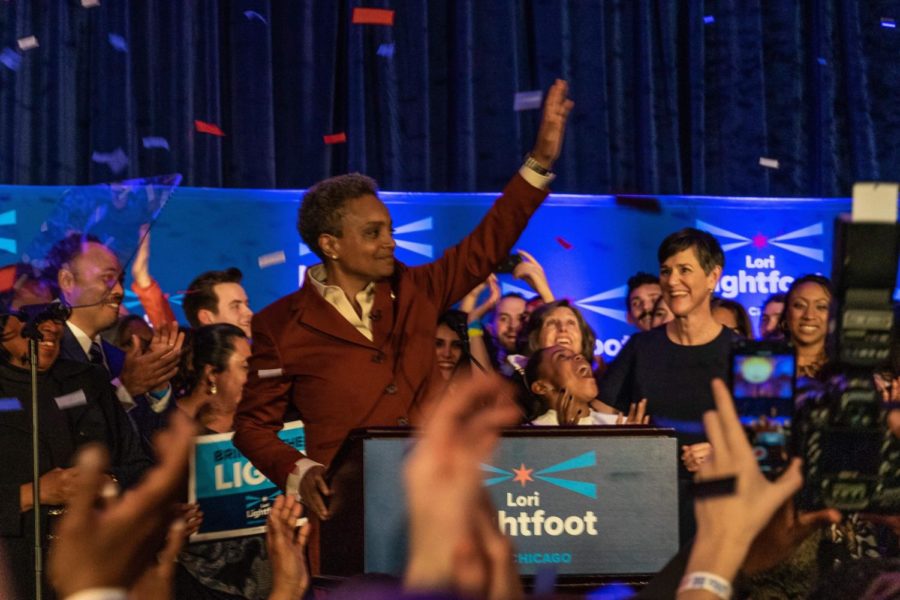The University of Chicago is situated in a politically active, contentious, and ever-evolving city. Here’s a breakdown of who you need to know in the executive and legislative branches of the city government.
Mayor
Lori Lightfoot (J.D. ’89) beat out 14 other candidates in one of the most crowded mayoral races in Chicago history this spring, going head-to-head with another alumna, Cook County Board President Toni Preckwinkle (A.B. ’69, A.M. ’77) in a historic final runoff.
She succeeds Rahm Emanuel, who served two terms and was about to run for a third, before dropping out as he grew increasingly unpopular following controversial decisions regarding education and police reform.
In addition to being the first mayor who has graduated from the University, Lightfoot came into office embodying many other firsts: She’s the first Black female and the first openly gay mayor.
As mayor, Lightfoot’s primary duties include planning the city budget, exercising veto power on legislation passed by the Chicago City Council, appointing members to boards and commissions, and appointing aldermen in the case of vacancies.
Several big issues loomed over her head as she assumed office, including a $838 million city budget deficit and tense contract negotiations with the Chicago Teachers Union that most recently led the union to set dates for a strike authorization vote.
Lightfoot’s notable accomplishments since she assumed office revolve around reforms for aldermen, many of whom—historically, but also in the past year—have been implicated in corruption scandals.
In her first act as mayor, Lightfoot signed an executive order limiting aldermanic prerogative—a privilege giving aldermen final say over development and zoning in their wards, thereby centralizing more power in City Council decisions. She also introduced an ordinance that passed in City Council that bars aldermen and city employees from doing work outside of City Hall that could pose conflicts of interest.
Aldermen
Chicago’s 50 aldermen make up City Council. They primarily propose and vote on legislation, as well as oversee and manage funds for development projects in their individual wards.
The University and Hyde Park span an area that lies in three wards, so there are three aldermen to watch .
Leslie Hairston, Fifth Ward
The Fifth Ward spans most of campus and Jackson Park, the site of the forthcoming Obama Center southeast of campus.
Leslie Hairston, an alumna of the UChicago Laboratory Schools, has been alderman since 1999. Some of her accomplishments in office include the $162 million renovation of South Lake Shore Drive, the construction of the Midway Plaisance skating rink, and the establishment of the Comer Children’s Hospital.
She has long been an ardent supporter of the Obama Center, and has historically opposed a Community Benefits Agreement (CBA) ordinance, which would bind developers of the Center to requirements aimed at preventing displacement. After residents overwhelmingly voted in favor of the ordinance in a referendum, she said she has changed her mind, and—with Alderman Jeanette Taylor (below)—introduced a version of the ordinance in City Council.
Jeanette Taylor, 20th Ward
The 20th Ward spans the area directly south of the Midway, including residential areas directly west of the planned site of the Obama Center.
In the spring, Jeanette Taylor beat out eight other candidates in one of the most crowded aldermanic races in the city. As three of the past four aldermen before her have been indicted on corruption charges, Taylor ran largely on protecting community trust—which she had long built up through leading a hunger strike to keep a local high school open and pressuring the University to open a trauma center, which the University did in May 2018.
Taylor campaigned from the beginning in strong support of a CBA ordinance, and has been working with Hairston to push their ordinance through City Council.
Sophia King, Fourth Ward
The Fourth Ward spans the area of Hyde Park north of campus.
Sophia King was appointed interim alderman in 2016 by then mayor Rahm Emanuel, after the previous alderman resigned. She was officially elected alderman in a 2017 special election.
King’s accomplishments in office include leading a mental health task force to examine the possibility of expanding mental health services in response to the city closing down half of its mental health facilities, as well as carrying out the renaming of a major street after prominent African-American female journalist Ida B. Wells.
Most recently, King is pushing an ordinance through City Council to raise Chicago’s minimum wage.









